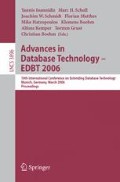Abstract
Recently, progress indicators have been proposed for SQL queries in RDBMSs. All previously proposed progress indicators consider each query in isolation, ignoring the impact simultaneously running queries have on each other’s performance. In this paper, we explore a multi-query progress indicator, which explicitly considers concurrently running queries and even queries predicted to arrive in the future when producing its estimates. We demonstrate that multi-query progress indicators can provide more accurate estimates than single-query progress indicators. Moreover, we extend the use of progress indicators beyond being a GUI tool and show how to apply multi-query progress indicators to workload management. We report on an initial implementation of a multi-query progress indicator in PostgreSQL and experiments with its use both for estimating remaining query execution time and for workload management.
Access this chapter
Tax calculation will be finalised at checkout
Purchases are for personal use only
Preview
Unable to display preview. Download preview PDF.
References
Abbott, R.K., Garcia-Molina, H.: Scheduling Real-time Transactions: a Performance Evaluation. VLDB, 1–12 (1988)
Blazewicz, J., Ecker, K.H., Pesch, E., et al.: Scheduling Computer and Manufacturing Processes, Second Edition. Springer, Heidelberg (2001)
Carey, M.J., Krishnamurthi, S., Livny, M.: Load Control for Locking: The ’Half-and- Half’ Approach. In: PODS, pp. 72–84 (1990)
Chaudhuri, S., Kaushik, R., Ramamurthy, R.: When Can We Trust Progress Estimators for SQL Queries? In: SIGMOD Conf. (2005)
Cormen, T.H., Leiserson, C.E., Rivest, R.L., et al.: Introduction to Algorithms, Second Edition. MIT Press, Cambridge (2001)
Chaudhuri, S., Narasayya, V.R., Ramamurthy, R.: Estimating Progress of Long Running SQL Queries. In: SIGMOD Conf., pp. 803–814 (2004)
Faloutsos, C., Ng, R.T., Sellis, T.K.: Predictive Load Control for Flexible Buffer Allocation. In: VLDB 1991, pp. 265–274 (1991)
IBM Autonomic Computing homepage, http://www.research.ibm.com/autonomic
Khanna, S., Sebree, M., Zolnowsky, J.: Realtime Scheduling in SunOS 5.0. In: USENIX Winter 1992, pp. 375–390 (1992)
Lohman, G.M., Lightstone, S.: SMART: Making DB2 (More) Autonomic. In: VLDB 2002, pp. 877–879 (2002)
Luo, G., Naughton, J.F., Ellmann, C.J., et al.: Toward a Progress Indicator for Database Queries. In: SIGMOD Conf. 2004, pp. 791–802 (2004)
Luo, G., Naughton, J.F., Ellmann, C.J., et al.: Increasing the Accuracy and Coverage of SQL Progress Indicators. In: ICDE, pp. 853–864 (2005)
Microsoft AutoAdmin Project homepage, http://research.microsoft.com/dmx/autoadmin
McWherter, D.T., Schroeder, B., Ailamaki, A., et al.: Priority Mechanisms for OLTP and Transactional Web Applications. In: ICDE, pp. 535–546 (2004)
Oracle Database: Manageability, http://www.oracle.com/database/index.html?db_manageability.html
Pinedo, M.: Scheduling: Theory, Algorithms, and Systems, Second Edition. Prentice Hall, Englewood Cliffs (2001)
PostgreSQL homepage (2005), http://www.postgresql.org
Ramamritham, K.: Real-Time Databases. Distributed and Parallel Databases 1(2), 199–226 (1993)
Shasha, D., Bonnet, P.: Database Tuning: Principles, Experiments, and Troubleshooting Techniques. Morgan Kaufmann Publishers, San Francisco (2002)
Silberschatz, A., Galvin, P., Gagne, G.: Operating System Concepts, Sixth Edition. John Wiley, Chichester (2002)
Homepage, T.P.C.: TPC-R benchmark, http://www.tpc.org
Michael, W.: Watzke. Personal communication (2005)
Weikum, G., Hasse, C., Moenkeberg, A., et al.: The COMFORT Automatic Tuning Project. Inf. Syst. 19(5), 381–432 (1994)
Zhao, W.: Special Issue on Real-Time Computing Systems. Operating Systems Review 23(3) (1989)
Author information
Authors and Affiliations
Editor information
Editors and Affiliations
Rights and permissions
Copyright information
© 2006 Springer-Verlag Berlin Heidelberg
About this paper
Cite this paper
Luo, G., Naughton, J.F., Yu, P.S. (2006). Multi-query SQL Progress Indicators. In: Ioannidis, Y., et al. Advances in Database Technology - EDBT 2006. EDBT 2006. Lecture Notes in Computer Science, vol 3896. Springer, Berlin, Heidelberg. https://doi.org/10.1007/11687238_54
Download citation
DOI: https://doi.org/10.1007/11687238_54
Publisher Name: Springer, Berlin, Heidelberg
Print ISBN: 978-3-540-32960-2
Online ISBN: 978-3-540-32961-9
eBook Packages: Computer ScienceComputer Science (R0)

